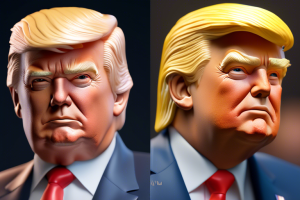US Department of Justice Indicts Chinese-Based Chemical Manufacturers and Employees
The US Department of Justice (DOJ) announced on Tuesday that they have issued indictments against companies based in China and their employees who are believed to be connected to the production and distribution of fentanyl, a synthetic opioid that is 50 to 100 times more potent than morphine. The DOJ’s briefing also reveals that these companies may have used cryptocurrencies in their financial activities related to their suspected illicit activities.
US Treasury Imposes Sanctions and Identifies Crypto Wallets
In line with the DOJ’s actions, the US Treasury’s Office of Foreign Assets Control (OFAC) has placed sanctions on 28 entities and individuals involved and identified 16 crypto wallets believed to be associated with the indicted parties.
Justice Department announces indictments against China-Based Chemical manufacturer Companies and employees
— Justice Department (@TheJusticeDept) October 3, 2023
OFC Targets Pharmaceutical Technology Company and Individuals Holding Crypto Assets
OFC targeted Hangzhou Pharmaceutical Technology, Huberville Botch, and several individuals holding crypto assets, including Bitcoin, Ethereum, USD Coin, Tether, and Tron, for suspected unlawful activities.
“We have identified and blocked over a dozen virtual currency wallets associated with this actor,” Treasury Deputy Secretary Wally Adeyemo said in a press conference. “The blocked wallets, which received millions of USD funds over hundreds of deposits, illustrate the scope and scale of the operation treated today.”
Crypto and the Drug Trade
Today’s actions aren’t the first time that cryptocurrencies have been found on the criminal drug trade. The recurring connection has sparked calls from politicians for action.
Last June, Elizabeth Warren, the US Senator for Massachusetts, raised concerns about the use of crypto in funding the fentanyl trade, prompting her to call for stricter regulation of the industry.
“This group sold enough precursor drugs in exchange for crypto to produce $540 billion worth of fentanyl pills,” she said during her turn at the Senate Banking Committee. “That’s enough fentanyl to kill nearly 9 billion people, all paid for by crypto.”
Last year, fentanyl was estimated to have caused over 67,000 deaths in the United States alone.
A dose as small as two milligrams can kill a grown adult, according to the Justice Department.
Hot Take: Crypto’s Role in the Ongoing Battle Against Drug Trade
The recent indictments and sanctions targeting Chinese-based chemical manufacturers and individuals involved in the production and distribution of fentanyl highlight the role that cryptocurrencies play in facilitating illicit activities. This case underscores the need for increased regulation and scrutiny of crypto transactions to prevent their misuse in funding illegal operations. While cryptocurrencies offer benefits such as privacy and ease of use, it is crucial to strike a balance between innovation and security. Governments and regulatory bodies must work together with industry stakeholders to establish effective measures that combat money laundering and illicit financial activities while still allowing for legitimate use cases of cryptocurrencies.
Demian Crypter emerges as a true luminary in the cosmos of crypto analysis, research, and editorial prowess. With the precision of a watchmaker, Demian navigates the intricate mechanics of digital currencies, resonating harmoniously with curious minds across the spectrum. His innate ability to decode the most complex enigmas within the crypto tapestry seamlessly intertwines with his editorial artistry, transforming complexity into an eloquent symphony of understanding. Serving as both a guiding North Star for seasoned explorers and a radiant beacon for novices venturing into the crypto constellations, Demian’s insights forge a compass for informed decision-making amidst the ever-evolving landscapes of cryptocurrencies. With the craftsmanship of a wordsmith, they weave a narrative that enriches the vibrant tableau of the crypto universe.











